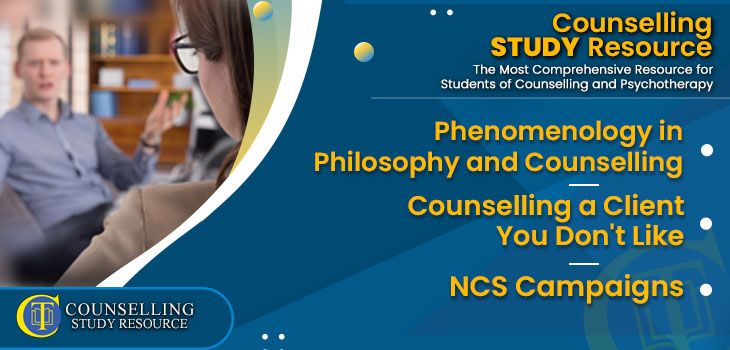264 – Counselling a Client You Don't Like
Phenomenology in Philosophy and Counselling – NCS Campaigns
In Episode 264 of the Counselling Tutor Podcast, your hosts Rory Lees-Oakes and Ken Kelly take us through this week’s three topics:
- Up first in ‘Theory in Practice’, we look at the philosophy of phenomenology and counselling.
- Then in ‘Practice Today’, Rory and Ken speak about counselling a client you don't like as a person.
- And lastly in ‘Practice Matters’, Rory is once again speaking with Meg Moss, head of policy and public affairs at the National Counselling Society (soon to be the National Counselling and Psychotherapy Society) about some of the campaigns the society is currently involved in.
Phenomenology in Philosophy and Counselling [starts at 02:34 mins]
Counselling Foundations is sponsored by
Counselling Skills Academy
Learn counselling techniques by seeing counselling skills used in real sessions by qualified therapists.
Real sessions - real-life presentations - real skills.
Some people may find phenomenology as hard to understand as it is to pronounce, but in this section, Rory and Ken attempt to break it down and discuss how it applies to the therapy room:
- Phenomenology is the structure of consciousness, how we perceive ourselves in the world.
- This is something unique to you.
- The challenge of counselling is suspending your own frame of reference, putting it aside, and looking at things from the clients’ point of view.
- How does the client see things?
- Ask clarifying questions – what might be a happy occasion for some, may not be for others (e.g. a pregnancy or holiday such as Christmas).
- During therapy, you are helping the client make sense of their reality and place within the world (their phenomenology).
- ‘Dasein’ – your being in the world, as a counsellor your aim is to understand this.
- Personal Development – think about what you view as your own being in the world.
A handout on Phenomenology in Person-Centred Counselling is available for download in the green button above.
Counselling a Client You Don't Like [starts at 18:51 mins]
You may find that one day you have a client that you don’t like or struggle to view with an unconditional positive regard. In this section, Rory and Ken discuss what you might do in this situation.
- Take these feelings to supervision – try and find out why you are having these feelings.
- Think about transference – does the client remind you of someone? Are you projecting the feelings you had towards someone from your past onto the client?
- Are you getting nervous before a particular client comes in? Or feeling unusually excited?
- Is the client using harsh language that clashes with your personal values?
- Do they have opposing political views to you?
- When counselling a client you don’t like, think about how you will go about separating your personal values.
- A client has come to you to explore or heal some sort of pain. It’s sometimes possible that these strong views are a defense mechanism for something that is internalised for them.
- Another way to work with a client you don’t like in therapy is to reframe. Imagine yourself and this person in a different situation – how would you interact?
NCS Campaigns [starts at 31:21 mins]
The National Counselling Society is proud to sponsor Practice Matters.
NCS are really excited to have launched their Children and Young People Therapist Register for counsellors working with the younger age group.
In this week’s ‘Practice Matters’, Rory speaks with Meg Moss from the NCS, soon to be NCPS, on the campaigning they take part in as a society.
The key points of this discussion include:
- The society is currently aiming to highlight the role of counselling and psychotherapy in mental health provision to help stop the move into digitalisation and low impact assistance.
- We are seeing an increase in funding for crisis services, but this alienates the people in the middle. People that low impact help isn’t enough for, but aren’t yet at the point of needing crisis services are left without support.
- The NCS is not only looking at sharing this information with the current government and MPs, but looking at educating possible future government too.
- They are attempting to spread this information and raise awareness widely.
- There is the opportunity to utilise fully qualified private practitioners with far shorter waiting lists.
- There seems to be an increasing lack of humanity in an area that is so human centered.
- Hoping for an increase in patient-led treatment – being able to choose their own therapist who they feel they can build a good and successful therapeutic relationship with is likely to increase the success rate of the client’s counselling.


